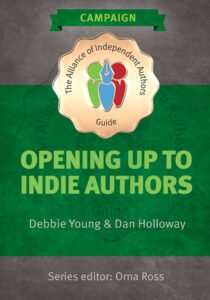Writing competitions abound, and new ones are announced every day, it seems. Yet entering a writing competition takes time, effort and organisational skills, as well as distracting you from arguably more important things – such as writing and self-publishing your next book! Is it worth it? Debbie Young considers.
In a recent straw poll of ALLi authors, six key factors emerged as reasons that writers enter writing competitions:
- Earning the status of award-winning author
- Additional exposure for your work to a new audience
- The opportunity to have your entry published at someone else's expense (a typical prize in a writing competition, whether for novels or for short works)
- The endorsement of your work by a third party – a kind of substitute for the approval of a commercial publisher
- The value of a new writing prompt, if the brief includes a theme (I recently wrote some flash fiction for a project specifically about local government services – something I'd never been inspired to do before, but was thrilled when one of my stories was chosen for the winners' anthology!)
- To motivate you to write and complete a piece of work by a set deadline
But there are also lots of reasons not to enter:
- Time better spent elsewhere (e.g. writing and self-publishing your next book!)
- Fear of rejection (after all, there are likely to be far more losers than winners)
- Cost of entry fees, where charged (these can range from free to a modest to extremely high – while charging entry fees to cover costs of running a competition is fine, and also to limit entries to the best work of serious authors, I've seen many entry fees that are clearly exploitative)
- Slow response times – the conditions of entry may constrain you from sending your manuscript elsewhere until the results are announced
Assuming you decide that the potential benefits of entering competitions outweigh the risks, you can help yourself by making sure you enter only the ones that are best suited to your work, so that the odds aren't stacked against you. Useful points to check are:
- Find out who the judges are – do you respect their judgement?
- Is the game worth the candle – does the chance and potential reward of winning justify your time, cost and effort?
- Check out the quality of previous winners – would you be in good company if you won? (I've seen some winners' lists that looked like a warning against how to self-publish badly.)
- Check out how many winners there are – although a large number might suggest a greater chance of winning, if it looks as if every entrant wins a prize, the bigger winner is probably the organiser, collecting all their entry fees!
 Read more advice about choosing and entering writing competitions in Chapter 8 of the ALLi handbook, Opening Up To Indie Authors, which I co-authored with Dan Holloway. The ebook is free to ALLi members as a membership benefit, while non-members may purchase the ebook online in a range of formats via our Shop page on this site.
Read more advice about choosing and entering writing competitions in Chapter 8 of the ALLi handbook, Opening Up To Indie Authors, which I co-authored with Dan Holloway. The ebook is free to ALLi members as a membership benefit, while non-members may purchase the ebook online in a range of formats via our Shop page on this site.
Join the conversation via the comments box! What motivates you to enter writing competitions – and what deters you? Are there any particular competition successes that you'd like to celebrate here? We'd love to know!
“6 great reasons to enter #writing competitions by @DebbieYoungBN for @IndieAuthorALLi: https://selfpublishingadvice.org/competitions/”







[…] 6 Great Reasons to Enter Writing Competitions […]
As the promoter of the recently inaugurated Quagga Prize, I’d like to make a few points about the costs, the judging and the rewards of prizes. Yes, I underwite Debbie’s Six Great Reasons for entering, but cavil over the reasons for abstaining. If you’re afraid of rejection or too busy writing (who isn’t?) then you are cutting yourself off from the many excellent reasons for entering.
As for cost of entering, that depends on your ambition. Booker is out anyway as the mandate states that ‘self-published books are not eligible where the author is the publisher.’ Bridport and others charge relatively high entry fees. I charge a submission fee of £15 which includes a Judges Report and the possibility of an honest review on Amazon or Good Reads. That’s worth something;
As for the quality of the judging, you can check out the judge’s credentials by looking at his or her past reviews on, say, Amazon. If you don’t like the sound of them, don’t bother with them. Maybe the judge has a preference for horror, sci-fi or romance and that’s not your scene. Go elsewhere, if what you want is praise rather than criticism.
I write what I feel about a book, rather than what the writer wants to hear. This year I consider myself lucky because all the books received were worth the effort of reading, many delighted me and the cost, Debbie, to me – in advertising was cheap – just over £1,000 and well worth the effort, plus the knowledge that I might have done some good for new writers seeking advancement and publicity.
A Big Thankyou to all entrants
Dear Writer,
Thank you so much for entering this year’s Quagga Prize. As you may know last year saw the biggest ever upward swing in the independent sector. It also marked the institution of the Open Up to Indies Campaign. You are a vital part in this endeavour.
The result of the Prize will be posted on the Quagga website, but for your convenience I am attaching a copy herewith. If you are among the winners, please don’t be shy of publicising your result, possibly on the cover of the next edition of your book. Any further recommendations of the Prize (the 2015 form is available on the website) would be greatly appreciated.
In due course you will be receiving the Judges Report on your book. A more comprehensive review will eventually be posted on the Quagga website, under Book Reviews. I have borne in mind the fact that honest reviews are a key ingredient in book publicity, and accordingly will publish the best ones on Amazon and Good Reads.
Of course Quagga is small – but growing. It’s not exactly Booker is it (Did I hear someone murmur ‘Thank the Lord!’?) whose arms are now extending from Home and Colonial to other parts of the globe, notably the USA. But there are still some of us who still believe that Small is Beautiful. At least it’s manageable and, on the evidence so far, offers a fine selection of deep and wide-ranging fiction.
Thank you all, once again. I hope to hear from you again very soon.
Sincerely,
David James
(November, 2014)
There’s a post about the new HNS Indie Award elsewhere on the blog, by the way (written the day after this post went live) – you can read it here: https://selfpublishingadvice.org/hns/. The post includes details of how to enter. (No entry charge, by the way – hurrah!)
And hot off the press: a new competition has just been launched by author services provider SilverWood Books & Kobo Writing Life, for which the prize is an ebook publishing package plus lots of PR via Kobo on its launch. You’ll find details of that one here: http://www.silverwoodbooks.co.uk/news/2014/sep/15/open-day-competition-with-kobo-writing-life
The issue with judges is less whether you respect their opinion and more to give an indication of what would be needed in order to win and whether you can produce that – Bridport judges, for example, often outline what they think makes a great short story/poem. That’s very helpful for knowing whether or not a comp is worth your time.
My big ‘break’ came when I won the Daily Mail First Novel Award in 2008. It was the big ticket prize – publication, plus a substantial amount of money. For a very short period of time, I was going to be the next Joanne Harris. The association with one publication was difficult. The Bookseller aside, other magazines and newspapers were reticent to interview me. Half-truths and White Lies sold respectably, but not brilliantly. I was under no illusions. My book was judged to be the best book written by the unpublished writers who entered. It was not – as many readers thought – the best debut novel of 2008. Expectations were perhaps a little too high. (I have just read the Miniaturist – twice.) My next book was rejected. In the long-term, I am appreciative that this was the outcome. My sucess came too soon. My writing wasn’t yet mature enough. I wouldn’t have been ready for a contract that required me to produce a novel a year. But, at the time, it was the most exciting thing that had ever happenned to me!